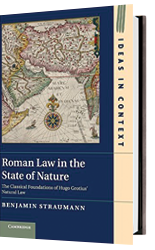Benjamin Straumann

Roman Law in the State of Nature offers a new interpretation of the foundations of Hugo Grotius’ natural law theory. Surveying the significance of texts from classical antiquity, Benjamin Straumann argues that certain classical texts, namely Roman law and a specifically Ciceronian brand of Stoicism, were particularly influential for Grotius in the construction of his theory of natural law. The book asserts that Grotius, a humanist steeped in Roman law, had many reasons to employ Roman tradition and explains how Cicero’s ethics and Roman law – secular and offering a doctrine of the freedom of the high seas – were ideally suited to provide the rules for Grotius’ state of nature. This fascinating new study offers historians, classicists and political theorists a fresh account of the historical background of the development of natural rights, natural law and of international legal norms as they emerged in seventeenth-century early modern Europe.
Table of Contents
Introduction
1. Natural law in historical context
2. A novel doctrine of the sources of law: nature and the classics
3. Proving natural law: the influence of classical rhetoric on Grotius’ method
4. Social instinct or self-preservation?
5. Justice for the state of nature: from Aristotle to the Corpus Iuris
6. Grotius’ concept of the state of nature
7. Natural rights: Roman remedies in the state of nature
8. Natural rights and just wars
9. Enforcing natural law: the right to punish
Epilogue
Bibliography
Index.


